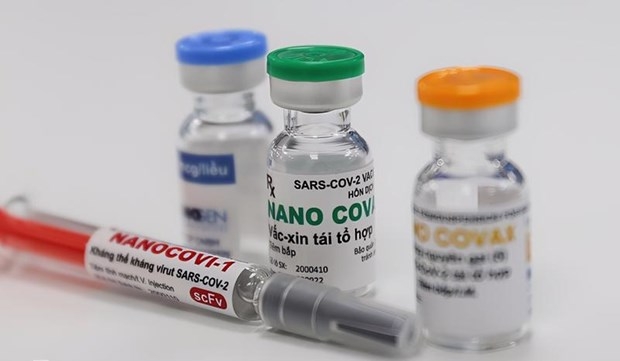Drugmakers prepare to offer home vaccines to the world
 |
| Nano Covax, a recombinant spike protein vaccine, is the forerunner in the race for domestically produced COVID-19 vaccine. Photo: VNA |
HLB Inc., a South Korean drugmaker, has inked a deal with Nanogen to secure the rights to supply the Nanocovax vaccine across the globe, with the exception of India and Vietnam itself. The two sides agreed on tech transfer for the South Korean group to produce and sell the vaccine, as well as to carry out marketing campaigns globally.
Nanocovax is Vietnam’s domestically developed coronavirus vaccine, currently in phase 3 clinical trials. Once completed, Nanogen will seek out the World Health Organization’s approval. The company already sent a sample to the organisation in July.
HLB chairman Jin Yang-gon is among the Board of Directors at Nanogen, while his company’s affiliate, NextScience, holds a 10.4-per cent stake in Nanogen as its third-largest shareholder. HLB Pharmaceutical, another subsidiary, also inked a deal with Nanogen last December to expand their presence in the global market. We will open the doors to domestic and overseas markets by securing the global rights of Nanocovax, which has proven its high efficacy and safety amid the growing disruption in the supply worldwide,” Jin said.
Also in August, Nanogen signed an agreement with India’s Vekaria Healthcare LLP for tech transfer, production, and distribution of Nanocovax. The agreement will be the basis for both companies to enter into a deeper discussion on the details of the cooperation related to the large-scale production and distribution of Nanocovax when it receives its licence.
Vekaria Healthcare, a subsidiary of Vekaria Group, had also researched and studied many potential vaccines before settling on Nanocovax.
Phong Quach, head of consulting at Ipsos Strategy3 Vietnam told VIR, “There are significant opportunities for vaccines due to the need of herd immunity. The more crowded a population is, the larger the market is. We expect that Asia-Pacific is one of the major regions with substantial opportunities, with an estimated value of up to $29 billion.”
He added, “A vaccine from Vietnam could earn benefits from accessing ASEAN as the market might be more familiar to manufacturers, and already established relationship between governments could help too. Based on the previous case study, we can foresee that the success of the Vietnamese vaccine will depend on the approvals, logistical requirements, and its efficacy.”
Vietnam has developed four COVID-19 vaccines. Nanocovax, produced by Nanogen in partnership with the Vietnam Military Medical University, and Covivac, created by the Ministry of Health’s Institute of Vaccines and Medical Biologicals, are the frontrunners for success at this time.
Once fully tested, Nanogen stated that it could manufacture up to 100 million doses each year to satisfy both domestic and export demands. However, so far Nanocovax has not reached the final approval stage.
Ipsos’ Phong Quach said, “One of the critical factors is the timing of introducing the coronavirus vaccine to the market. We foresee that the market size will decline from 2023 onwards because most – if not all – countries are trying to target herd immunity as soon as possible, and 2022 will be the year with rising vaccine sales globally, particularly in Asia-Pacific. Thus, vaccine developers need to time their global sales after complying with all approval processes.”
“Meanwhile, Pfizer and BioNTech along with Johnson & Johnson have multiple agreements with contract manufacturers and developers. Nanocovax likely needs a viable strategy to leverage on established vaccines,” Quach added.
What the stars mean:
★ Poor ★ ★ Promising ★★★ Good ★★★★ Very good ★★★★★ Exceptional
Themes: Healthcare Platform
- PM outlines new tasks for healthcare sector
- Opella and Long Chau join forces to enhance digestive and bone health
- Hanoi intensifies airport monitoring amid Nipah disease risks
- Cosmetics rules set for overhaul under draft decree
- Policy obstacles being addressed in drug licensing and renewal
Related Contents
Latest News
More News
- VNPAY and NAPAS deepen cooperation on digital payments (February 11, 2026 | 18:21)
- Vietnam financial markets on the rise amid tailwinds (February 11, 2026 | 11:41)
- New tax incentives to benefit startups and SMEs (February 09, 2026 | 17:27)
- VIFC launches aviation finance hub to tap regional market growth (February 06, 2026 | 13:27)
- Vietnam records solid FDI performance in January (February 05, 2026 | 17:11)
- Manufacturing growth remains solid in early 2026 (February 02, 2026 | 15:28)
- EU and Vietnam elevate relations to a comprehensive strategic partnership (January 29, 2026 | 15:22)
- Vietnam to lead trade growth in ASEAN (January 29, 2026 | 15:08)
- Japanese business outlook in Vietnam turns more optimistic (January 28, 2026 | 09:54)
- Foreign leaders extend congratulations to Party General Secretary To Lam (January 25, 2026 | 10:01)

 Tag:
Tag:




















 Mobile Version
Mobile Version